Kino's Journey: Volume 1 - Idle Adventurer (DVD)
Introduction
It's a good thing that I'm not a studio executive, as I have been totally jaded by years of naff television consumed in the eighties. If someone came up to me and said they had an idea for a hero who can change into animals, a superhero who escapes from a computer, or a band of mercenaries who expend millions of rounds of ammunition without ever hitting a target, then my response would be cynical at best, derisory at worst. The thing about the entertainment industry is that it likes to play it safe, and if a show has worked in a certain way before, then subsequent attempts will stick slavishly to the format established. It's what ground Star Trek into cancellation a few years back. So along comes Kino's Journey, and it's about an adventurer and a talking motorcycle. I'm instantly having Knight Rider flashbacks, and they aren't pleasant. Knight Rider was juvenile and pathetic; enjoyable enough when I was equally juvenile and pathetic, but once I entered my teens, it grew increasingly less satisfying. The powers that be have tried reinventing Knight Rider on more than one occasion, to increasingly dismal receptions. Half an episode of Team Knight Rider had me wishing for early blindness. You can understand that a show about a talking motorcycle wasn't at the top of my must see list. But this isn't Hollywood, it's Japan, it isn't live action, it's anime, and Kino's Journey has been lauded and critically acclaimed and raved about by anime fans for years now. With one finger on the remote control just in case of any stray Hasslehoff, I venture into the world of Kino's Journey.
Kino is a young adventurer who is travelling the world on a motorrad named Hermes, to all intents and purposes a talking motorcycle. It's a strange world that Kino travels, set in some unspecified future, full of wonders and mystery. It's not for the timid, and naturally Kino is armed for self-defence. Kino has one rule, to never stay in any one place for more than three days, to keep on moving so as to keep learning something new, and to never settle down.
This first volume of Kino's Journey comes with four episodes.
1. Land Of Visible Pain
Following a map is never easy in a world that constantly changes. A cliff's edge appears where a road should have been, but Kino isn't discouraged for long, as serendipity works in strange ways. The road leads to an odd deserted city. Everything is automated, from the customs booth to the restaurants and hotels, and Kino doesn't want for anything. Exploring an abandoned city could get to be a little dull, but the second night in, Kino learns where the people went. They went home. All of them are stuck inside their houses, never venturing out, never interacting, and fearful of everyone else.
2. A Tale Of Feeding Off Others
The depth of winter has arrived, deep snow lies everywhere, and Kino is hunting rabbit. Hunger isn't the problem for Kino, helping others is. A truck has been stranded in the deep snow, and three men have been gradually starving to death in the cold. It was sheer luck that Kino ran into them, and has been nursing them back to health ever since. The men are grateful for the help, and speak fondly of returning home in time for a festival as soon as the thaw comes. But they are rather reticent about what their truck was transporting.
3. Land Of Prophecies
Kino visits a seaside town where prophecy is central to everyone's belief. It wouldn't be such a major thing, were it not for the prophecy that indicated the world was going to end in two days. For Kino it is a stroke of luck, as the fatalistic residents are happy to offer accommodation and supplies gratis. As Kino continues to explore the area, it becomes apparent that all the neighbouring areas have been affected by the prophecy in various different ways.
4. Land Of Adults
Once upon a time, a little girl lived in a land where all the adults were happy, hardworking citizens, and they expected all their children to grow up the same way. She wasn't the happiest of children, as the other children picked on her and teased her. One day, a visitor came to her town, a man named Kino who loved to travel, to see new things, and enjoy new experiences. She duly invited him to stay at her family's guesthouse, but she found this adult outsider fascinating. He told her of the outside world, where adults could do what they enjoyed, rather than what was expected of them. She also helped Kino salvage and resurrect a battered motorrad, and he told her of the bond that forms between the bike and its rider. Then the little girl told Kino about the tradition of her country, that when children reached 12 years of age, they would go to the hospital and have that part of their brain that made them children cut out, and henceforth they would be responsible adults ever after. She also told him that her 12th birthday was in just 2 days.
Picture
We have an odd kettle of fish here with the packaging. In the specifications on the back it has 4:3 listed as the aspect ratio. Then just below that in the corner it has 16:9 letterbox, above which is a discrete anamorphic widescreen logo. I believe that is what is euphemistically known as covering all the bases. It turns out that Kino's Journey has a 1.78:1 anamorphic transfer that doesn't put a foot wrong during the runtime of the disc. The image is impeccable, with no signs of aliasing or compression artefacts, and even digital banding was conspicuously absent.
A lot of it has to do with the style of the anime itself. It's certainly a unique piece, very impressionistic and minimalist. I think there is a conceit that reinforces the fact that you are watching it on television, with horizontal scan lines deliberately placed in every frame. The character and world designs are simple but effective, and the show has a somewhat 2D feel that harks back to an earlier age of animation, eschewing the CG snazziness of modern productions. The palette is a gentle pastel one, which reinforces the story's ethereal and magical mood. Kino's Journey is a visual delight.
Sound
You have a choice between DD 5.1 English and DD 2.0 Japanese, along with the usual subtitles and signs tracks. Go with the English if you want the extra surround oomph, but the stereo is no small potatoes either, with audible separation and understated but effective sound design. The dialogue is clear in both versions, and there is nothing to fault about the dub. Except that I personally disliked the English dub voice of Hermes. Incidentally, make a note. Kino's Journey has the best opening song for an anime that I have heard yet. It's wonderful.
Extras
Not a lot of extras really, just the usual for the typical anime disc, comprising textless credit sequences, a 4-minute slideshow gallery, and trailers for Slayers Gorgeous, Full Metal Panic, Queen Emereldas, King Of Bandit Jing, and Final Fantasy Unlimited.
Inside the DVD case, you will find a four-page insert, two pages of which are devoted to a conversation between Kino and Hermes.
Conclusion
I've really got to stop saying that I have found my favourite anime, as by my best estimates I have 20 favourite anime by now. Well, better make that 21, as Kino's Journey is more than worthy of that list. Words like 'instant classic', 'critically acclaimed', and 'once in a lifetime' are often bandied about with abject carelessness, but they all apply here. Kino's Journey is unique, you'll have seen nothing like it before, and it will leave a lasting impression when the end credits roll.
If you are looking for a frame of reference, Kino's Journey lies somewhere between Haibane Renmei and Mushi-shi. It's like Haibane Renmei in that it shares that magical, ethereal feel. It's gentle and unassuming, it offers you stories that you submerge yourself in, and worlds that draw you in and captivate you. It's like Mushi-shi in that it has an anthology format, with Kino and Hermes visiting a new country each week, finding a new adventure and meeting new characters. At least that was what I thought after watching the first episode. With the second episode it becomes clear that there is something else to Kino's Journey that makes it unique. It has dark bleak core to it, a streak of pessimism that on the surface seems at odds with the fairy tale surroundings and the light airy feel to the stories. But then again, all fairy tales are dark and scary at the core, and the contrast with the happy-go-lucky peripatetic elements to the show actually makes the dramatic moments stand out in stark relief, and more effective for it.
There is a ominous overtone to the opening of the first episode, with Kino and Hermes discussing their situation, and wondering whether to return to a 'master', although who that faceless master is, is never revealed in this volume. It's a common conceit to throw viewers straight into the deep end, and we meet Kino and Hermes with no idea of who they are, we see a future world with no idea of how it came to be, or what the rules are in this fantastical place, and we get hints of a complex back-story that may or may not be revealed in the subsequent episodes. But just as Kino is on a journey, we're invited on a similar journey of discovery by watching these episodes. The episode then establishes the format of the show, with Kino and Hermes having just a self-imposed three days to explore a new land before moving on. The Land Of Visible Pain is a nice little mystery to start with, with an apparently uninhabited town run by robots, but there is a neat little Twilight Zone-esque twist to the tale. There is also a hint that the world of Kino is a dark and forbidding place, when we see Kino stood in front of a mirror, Travis Bickle style, practicing a fast draw. But overall the feeling is of a magical wonderful story, nice and safe and entertaining.
That feeling is immediately dispelled with the start of the second episode, when Kino blows the brains out of a rabbit. There's guilt about having to hunt, but the reason becomes clear when we meet the three truckers stranded in the winter wilderness, The episode is all about Kino saving their lives, and getting to know the characters, their hopes and dreams, their ambitions and their way of life, before the requisite turn up for the books. The Land Of Prophecies is a Gulliver-esque adventure as Kino travels between several closely situated lands, all of which are interlinked by a book of prophecy. Each new land has its story to tell, some little quirk that is unique to its people, and the whole story is played to emphasise the absurdist humour at its heart. There's quite a punchline to the show and I found myself laughing out loud.
We're back to the darker side of things in the final episode on this disc, which takes us to Kino's past, and the discovery of Hermes the motorrad. It's an outwardly charming and pleasant land that the girl lives in, but it masks an ominous totalitarianism that is quite chilling in its matter of fact approach to society. A society accepting and even complicit in the mind control of its citizens is reminiscent of the more chilling visions of the future like Soylent Green or Logan's Run, and this episode is just as effectively done. It also does a good job in filling in some, if not all of Kino's past.
There is some wonderful anime coming out of Japan, although just like entertainment anywhere else, you have to sort out the wheat from the chaff to find it. Kino's Journey is unique, memorable, charming and wondrous. There's nothing else out there like it, and I am rabidly looking forward to watching volume 2.
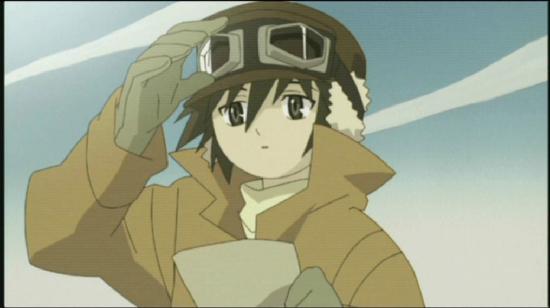
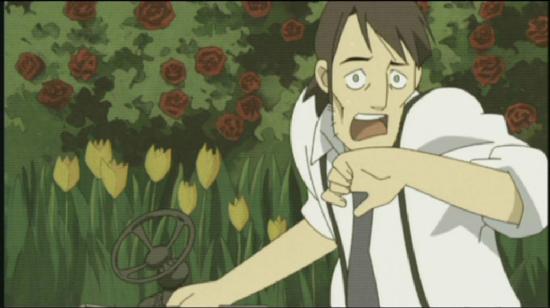
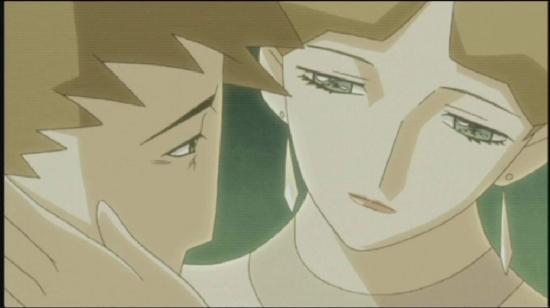
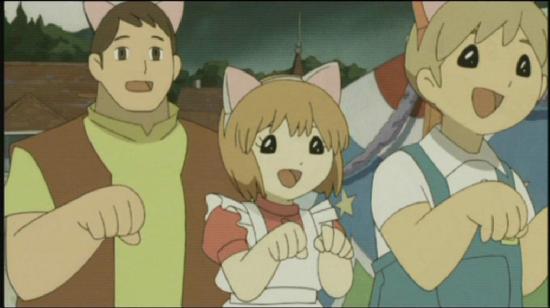
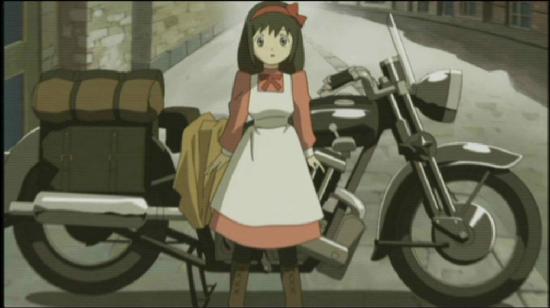
Your Opinions and Comments
Be the first to post a comment!